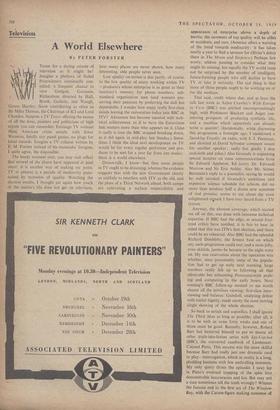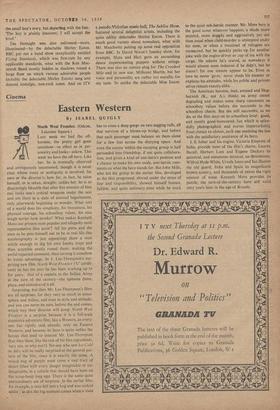Television
A World Elsewhere
By PETER FORSTER
THINK for a daring minute of television as it might be! Imagine a plethora of Nobel Prizewinners continually con- sulted; a' frequent chance to view Gielgud, - Guinness, Richardson, directed by Hall, Brook, Guthrie; and Waugh, Green, Hartley, Snow contributing as often as Sir Miles Thomas, the Chairman of ICI and Lord Chandos. Suppose a TV Times offering the names of all the dons, painters and politicians of high repute you can remember. Envisage TV without those American crime serials, with fewer Westerns, hardly any panel games, no plugs for latest records. Imagine a TV column written by E. M. Forster instead of his namesake. Imagine, I quite agree, the impossible.
The heady moment over, you may well reflect that several of the above have appeared at least once: it is another way of making my point. TV at present is a parade of mediocrity punc- tuated by moments of quality. Watching the election results, I thought yet again how much of the nation's life , does not get on television, how many places are never shown, how many interesting, able people never seen.
Low quality on-screen is due partly, of course, to the low quality of many working within TV —producers whose enterprise is as great as their secretary's memory for phone numbers; sub- standard organisation men (and women) pre.- serving their pensions by preferring the dull but dependable. I wonder how many really first-class minds leaving the universities today. join BBC or ITV? Adventure has become equated with tech- nical achievement, as if to have the Eurovision link matters more than who appears on it. (Also it really is time the BBC stopped breaking down, as it did again in mid-play last Sunday.) Some- times I think the ideal next development on TV would be for every regular performer and pro- ducer to be sent for a year far from any studio : there is a world elsewhere.
Dream-talk, I know—but then some people in TV ought to be dreaming, whereas the evidence suggests that with the new Government clearly as unlikely to interfere with ITV as the old, and the plum of a Third Network ahead, both camps are cultivating a surface respectability and appearance of enterprise above a depth of inertia; the moments of top quality will be alibis or accidents, and rare. (America offers a warning of the trend towards mediocrity: it has taken nearly a year to find a sponsor for Olivier's debut there in The Moon and Sixpence.) Perhaps few worry, seldom pausing to consider what they might be missing, but equally the TV world must not be surprised by the number of intelligent, future-forming people who still decline to have TV or take it seriously. The sad thing is that more of those people ought to be working on or for the medium.
That said, credit where due, and at least the talk last week in Aidan Crawley's With Europe in View (BBC) was pitched uncompromisingly high, with Professors Blackett and Auger con- sidering prospects of producing synthetic life, and a machine which apparently can already write a quartet! (Incidentally, while discussing this programme a fortnight ago, I mentioned a Speaking Frankly on radio, with S. J. Perelman, and directed at,David Sylvester comment meant for another speaker: sadly but gladly I don sackcloth and ashes.) Also Granada is organising special lectures on mass communications from Sir Edward Appleton, Ed (sorry Dr. Edward) Murrow and Sir Eric Ashby. Also Mr. Sidney Bernstein's reply to a journalist, saying he would be well satisfied if Granada's ambitious and expensive science schedule for schools did no more than produce half a dozen new scientists of real promise, seems to me about the most enlightened repark I have ever heard from a TV tycoon.
Anyway,, the election coverage, which started me off on this, was done with immense technical expertise. if BBC had the edge, as several four- eyed critics have testified, it is fair to bear in mind that this was 1TN's first election, and there could be no rehearsal. Also BBC had the splendid Richard Dimbleby, the firmest base on which any such programme could rest, and a most jolly, even skittish, jumbo he became as the night wore on. My one reservation about the operation was whether, since presumably some of the popula- tion had to get up early next morning, large numbers really felt up to following all that admirable but exhausting Panorwna-style prob- ing and computing in the early hours. Next evening's BBC follow-up seemed to me worth almost all the previous viewing; first-class inter- viewing and balance. Gaitskell, analysing defeat with rueful dignity, made surely the most moving single showing of the whole election.
So back to serials and soporifics. I shall ignore The Third Man as long as possible; after all, it is to be with us some forty weeks and one of those must be good. Recently, however, Robert Barr ha's bestirred himself to put to shame all other truth-into-fiction series with Spy-Catcher (BBC), the converted casebook of Lieutenant- Colonel Pinto. This success was the more skilful because Barr had really just one dramatic card to play—interrogation, which in reality is a long, plodding business with few enthralling moments. My only query (from the episodes I saw) lay in Pinto's eventual trapping of the spies into demonstrable inaccuracies and lies. But may not a man sometimes tell the truth wrongly? Witness the famous end to the first act of The Winslow Boy, with the Carson-figure making nonsense of
the small boy's story, but departing with the line: 'The boy is plainly innocent; I will accept the brief.'
The fortnight was also enlivened—more, illuminated—by the delectable Shirley Eaton. BBC put out a band show inexplicably entitled Flying Standards, which was first-rate by any applicable standards, what with the Ken Mac- intosh Band mostly hidden in shadows round a large floor on which various admirable people (notably the delectable Shirley Eaton) sang and danced nostalgic, non-rock tunes. And on ITV
a pseudo-Victorian music-hall, The Jubilee Show, featured several delightful artists, including the quite edibly delectable Shirley Eaton. There is much good variety about nowadays, what with Mr. Maschwitz putting up some real opposition from BBC. In David Nixon's Sunday show, for example, Mata and Hari gave an astonishing dance impersonating puppets without strings. There was also an outsize plug for The Crooked Mile and its new star, Millicent Martin, but her voice and personality are rather too metallic for my taste. So unlike the delectable Miss Eaton.







































 Previous page
Previous page